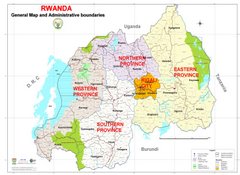Emmanuel MUNGWARAKARAMA
In order to lead their daily lives, People need a couple of things to satisfy; such as to be feed, accommodation, and other basic needs that are fundamental. But how can children learn with an empty stomach? Feeding a childat school tends to be an answer to this big challenge.A young child at an age to begin his primary school in Rwanda, whichis seven generally, he can't afford to concentrate on what he isstudying.
He is meeting friends and playing but when comes the hours to get lunch or a meal for the day, he may fall behind.The country is developing, with new technologies, the techniques inagriculture sector which covers almost 90% doesn't much with today'sworld. It needs to be improved. Though Rwanda withits development tends to promote its education by the principle ofEducation for all, but the constraints were very many. People couldnot send their children to school if they don't expect to come backand get what to eat. Strategies to get these children out of the trapcame into play.Feeding children at school began four years ago in 2003, and more came to join, the number of children increased from 1080 in 2003 to 1600 now. The headmistress of the primary school at Cyanika explained how thesituation changed with time. "By the days when this program hasn't yet started children could go home and were not coming back. Today parents are pushing them to come, because they are getting porridge for breakfast and lunch at noon". At a hilly top in Gikongoro, Nyamagabe district, children are playing,healthy apparently, NEW SENTENCE others can concentrate on thestudies, Cyanika primary school has a diversity of activities.
AN international organization Care based in Gikongoro, with itscollaborator Farmers to the Future Initiative managed to introduce inthe education curricula within nine districts of three provinces, three schools each and strengthen the agriculture assets. FOFI has contributed to the rural school areas by supplying seeds and even providing advice and consultancy by on soil technique.Karemera Protais, the project manager explains how the projects works:"We operate in close collaboration with primary schools in ruralareas; we support those schools in distributing seeds, advising andcounseling how to improve their agricultural techniques, we evenprovide cows." Protais continues by explaining the partners of the projects "this is a pilot project conjunctly governed by CARE and the Ministry of education, we offer training to teachers and the entire society through their children when returning home from schools."Students within their practical hours they can cultivate and have somemore foods to sustain themselves. They even provide some for a neighboring secondary school. They make money. The school had set a committee to manage the resources. Behind this an elected student's board by students has a full control of the management and can plan for their daily meal components.While at their home, children will help their parents with what they have learned from their teachers and improve techniques used in their rural areas.Parents can now learn from the children [and even] how to make an asset of a balanced diet. This improves nutrition standards for the children. Malnutrition in the region is being disappearing.Results are simple to observe but much remains to be done. Is this project being still helping? CARE uses funds from outside the country and those funds are budgeted annually. What will happen if the donors stop providing the little they give? The government of Rwanda should think how to maintain the momentum as it is planning to build another Rwanda. Some of the children will not be able to continue with higher level education and may return to their villages and join their peers. They will use the skills from the program. Managing a small scaled project and even techniques used to treats the terrain.The system has been implemented to push parents to let their children attend on a regular basis.
This may also be a step in the strengthening the government education policy. Education is not only a matter of attending but also performing. Does thegovernment think about increasing the quality of the teaching staff atall levels?
Monday, March 5, 2007
Subscribe to:
Comments (Atom)
Rwanda

Administrative map
Blog Archive
-
►
2010
(59)
- ► 09/19 - 09/26 (1)
- ► 07/11 - 07/18 (5)
- ► 07/04 - 07/11 (5)
- ► 06/27 - 07/04 (4)
- ► 06/20 - 06/27 (6)
- ► 06/06 - 06/13 (17)
- ► 05/30 - 06/06 (4)
- ► 03/28 - 04/04 (2)
- ► 02/28 - 03/07 (3)
- ► 02/21 - 02/28 (5)
- ► 01/24 - 01/31 (2)
- ► 01/17 - 01/24 (4)
- ► 01/10 - 01/17 (1)
-
►
2009
(25)
- ► 11/08 - 11/15 (9)
- ► 10/04 - 10/11 (2)
- ► 01/25 - 02/01 (2)
- ► 01/18 - 01/25 (12)
-
►
2008
(55)
- ► 12/28 - 01/04 (1)
- ► 12/21 - 12/28 (11)
- ► 12/14 - 12/21 (3)
- ► 12/07 - 12/14 (5)
- ► 11/30 - 12/07 (2)
- ► 11/16 - 11/23 (22)
- ► 11/09 - 11/16 (4)
- ► 07/13 - 07/20 (1)
- ► 06/01 - 06/08 (6)
-
▼
2007
(19)
- ► 05/20 - 05/27 (2)
- ► 04/01 - 04/08 (1)
- ► 02/25 - 03/04 (2)
- ► 02/18 - 02/25 (2)
- ► 02/11 - 02/18 (6)
- ► 02/04 - 02/11 (3)
- ► 01/28 - 02/04 (2)
-
►
2006
(59)
- ► 10/22 - 10/29 (12)
- ► 10/15 - 10/22 (1)
- ► 10/08 - 10/15 (2)
- ► 09/03 - 09/10 (2)
- ► 08/27 - 09/03 (6)
- ► 07/09 - 07/16 (7)
- ► 06/18 - 06/25 (1)
- ► 04/09 - 04/16 (5)
- ► 04/02 - 04/09 (23)